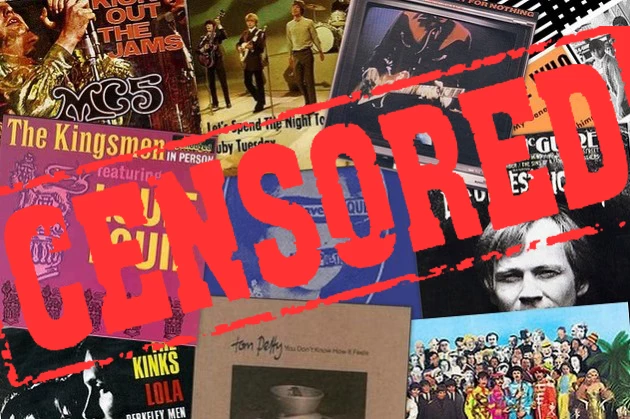 Rock ‘n’ roll has always been about breaking rules and pushing boundaries. So it’s not a surprise that every entry in our list of the Top 10 Censored Rock Songs is an all-out classic. The songs were either altered or banned completely from radio, television, department stores and even the singles charts. The reasons for the censorship are more varied than you might think, ranging from the usual sex-and-drugs content to insensitivity and product placement.
Rock ‘n’ roll has always been about breaking rules and pushing boundaries. So it’s not a surprise that every entry in our list of the Top 10 Censored Rock Songs is an all-out classic. The songs were either altered or banned completely from radio, television, department stores and even the singles charts. The reasons for the censorship are more varied than you might think, ranging from the usual sex-and-drugs content to insensitivity and product placement.
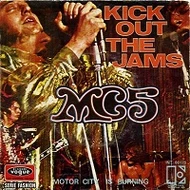
‘Kick Out the Jams’
MC5
“It’s time to … kick out the jams, mother---er!” It's the opening line from this proto-punk gem (along with the offending word printed on the album’s inside cover) that caused a ruckus when the MC5 released their debut album in 1969. The original edition of the LP was removed from store shelves and replaced with two versions: one with a censored cover and audio and another with the censored cover but uncensored audio (to be sold from only behind the counter). But the hometown Hudson’s department stores refused to carry any version of ‘Kick Out the Jams,’ which eventually became a ban on selling all records from MC5’s label, Elektra Records. To retaliate, the band took out full-page ads in Ann Arbor and Detroit newspapers with the words “F--- Hudson’s!” printed at the bottom. Elektra then dropped the group.
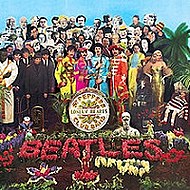
‘Lucy in the Sky With Diamonds’
The debate continues as to whether or not this psychedelic classic was about LSD. For his part, John Lennon always claimed he was inspired by artwork his son Julian brought home from school. When asked what the painting was, Julian told his dad that he had painted his classmate Lucy in the sky with diamonds. John wrote the bizarre imagery of the song’s lyrics as a result and maintained that the LSD initials were incidental. The BBC didn’t agree and banned the song from the airwaves because of perceived references to the hallucinogenic. Years later, fellow Beatle Paul McCartney claimed that it was “obvious” that the tune was about drugs.
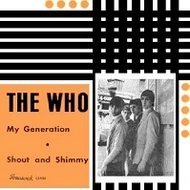
‘My Generation’
In this instance, it was a stutter that flustered the good ol' British Broadcasting Corporation. Upon the release of ‘My Generation,’ the BBC banned the song from the airwaves due to Roger Daltrey’s stuttering of some lines. The official reason was that the single might offend listeners who had stuttering problems. In addition, there were rumors that some folks at the BBC thought that the line “Why don’t you all f-f-f-fade away” suggested another f-word. The real reason for Daltrey’s stutter is nearly as elusive. Depending on who you believe, it was inspired by John Lee Hooker’s ‘Stuttering Blues,’ meant to mimic stuttering mods or was an accident caused by Daltrey trying to learn the lyrics. Regardless, after the song became popular, the BBC reversed the decision, and ‘My Generation’ received significant airplay.
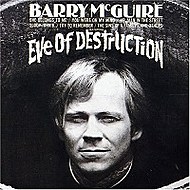
‘Eve of Destruction’
Barry McGuire
Barry McGuire never utters an obscenity in this protest cut (one of the few to make our list of the Top 10 Censored Rock Songs). He doesn't mention sex or drugs either. But ‘Eve of Destruction’ was banned by many U.S. radio stations (many of them in the south) because programmers disagreed with its ugly view of humanity (particularly the the U.S., which was buried in a war). Some felt that the single, with lines like “you’re old enough to kill but not for votin’,” was “an aid to the enemy in Vietnam.” P.F. Sloan was only 19 when he wrote the lyrics as a prayer for humanity and as a rallying cry against the evil he saw in the world. Many fans agreed with what they heard, sending the topical hit all the way to No. 1.
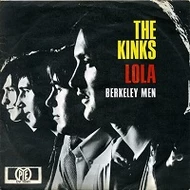
‘Lola’
The BBC censored Ray Davies’ ode to a sweet transvestite, but not for the reason you’d think. The broadcasters were fine with the title character -- who “walked like a woman and talked like a man” -- but not as happy with the reference to Coca-Cola. At the time, the BBC had a policy against airing material with product placement. Paul Simon would later run afoul of the censors with ‘Me and Julio Down by the Schoolyard’ (it mentions Newsweek) and ‘Kodachrome’ (for obvious reasons). In order to circumvent the ban, Davies had to fly all the way back to London from New York -- where the Kinks were touring -- to overdub “it tastes just like cherry cola.” The song was then cleared for airplay and became a No. 2 hit in the U.K.
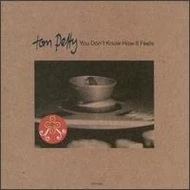
‘You Don’t Know How it Feels’
Tom Petty’s steady-rolling single might not have become a radio and MTV staple without one key change. On the censored version, when the Florida-born rocker sings “Let’s roll another joint” in the chorus, the offending word was played in reverse, and it ended up sounding like Petty somehow lost control of his mouth or just couldn’t come up with a proper rhyme for “point.” Not that it mattered. ‘You Don’t Know How it Feels’ reached No. 13 and won an MTV Video Music Award.
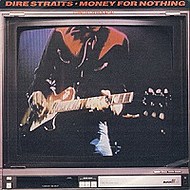
‘Money for Nothing’
Talk about delayed reaction. Dire Straits’ 1985 mega-hit ‘Money for Nothing’ wasn’t censored until 2011, when the Canadian Broadcast Standards Council deemed it unsuitable for airplay. The reason was frontman Mark Knopfler’s use of the word “faggot” in the second verse. The derisive term violated the council’s code of ethics and was forbidden on private Canadian radio stations. Some outlets protested the ban, due to the song’s enduring popularity and that the offensive word was not used in a hateful manner. Knopfler wrote the song after overhearing an appliance-store worker’s commentary while watching MTV in his shop. ‘Money for Nothing’ is written from this unenlightened man’s perspective. The CBSC altered the decision a few months later, maintaining its stance but allowing stations to use their own discretion.
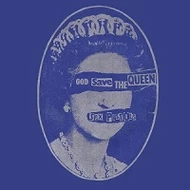
‘God Save the Queen’
British establishment took offense to this single’s title (stolen from the U.K.’s national anthem), cover artwork (featuring a defaced picture of Queen Elizabeth II), content (“there’s no future in England’s dreaming”) and, well, pretty much everything associated with it. Just in time for the Queen’s Silver Jubilee, Johnny Rotten equated the British monarchy with a fascist regime in an attempt to illustrate the divide between the royals and everyday people. Because of its anti-monarchy stance, the song was banned from the BBC and the Independent Broadcasting Authority. ‘God Save the Queen’ hit No. 1 on the NME chart, but reached only No. 2 on the official U.K. singles chart (it was suggested that it may have been rigged to keep the Pistols from the top spot). In some publications, the chart entry ran as two black bars on top of each other because the publishers found both the name of the song and the name of the band in poor taste.
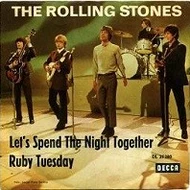
‘Let’s Spend the Night Together’
This rollicking, sexually suggestive Stones chestnut was never banned from the airwaves, although it earned the ire of Ed Sullivan. The TV host objected to a performance of the band’s latest hit on his popular Sunday-night program until a compromise was reached: Mick Jagger would sing “Let’s spend some time together” instead of the original lyric. Jagger (unlike Jim Morrison during the Doors' performance of ‘Light My Fire’) held up his end of the bargain, even though he repeatedly rolled his eyes at the camera. After the performance, the Stones returned to the stage wearing Nazi uniforms, at which point Sullivan barked at them to put their other clothes back on. The band left the theater and was banned from the show for the next two years.
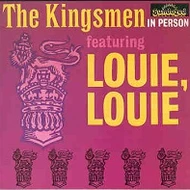
‘Louie, Louie’
The Kingsmen
Sometimes, songs are banned for no real reason at all -- like in the case of the No. 1 track on our list of the Top 10 Censored Rock Songs. The Kingsmen’s rip-roaring garage-rock nugget was banned from several radio stations, prohibited throughout the state of Indiana (thanks to its governor) and subjected to a 31-month investigation by the FBI. All because some teens somewhere started a rumor that the words singer Jack Ely was howling were about an explicit sexual encounter. In reality, the lyrics (written by Richard Berry in 1957) recounted a sailor’s rather banal ode to his dream girl. But because Ely was singing in pidgin English, screaming at the top of his lungs and wearing new braces, his enunciation wasn’t perfect, and rumors escalated. The FBI then spent a fair amount of taxpayer dollars interviewing almost everybody associated with the recording and listening to the hit single at various speeds in an attempt to decipher the “true” meaning. In the end, the FBI threw their hands up and declared their inability to interpret any of the lyrics. Despite, and because of, its reputation, ‘Louie Louie’ has become one of the most important songs in rock history.
No comments:
Post a Comment